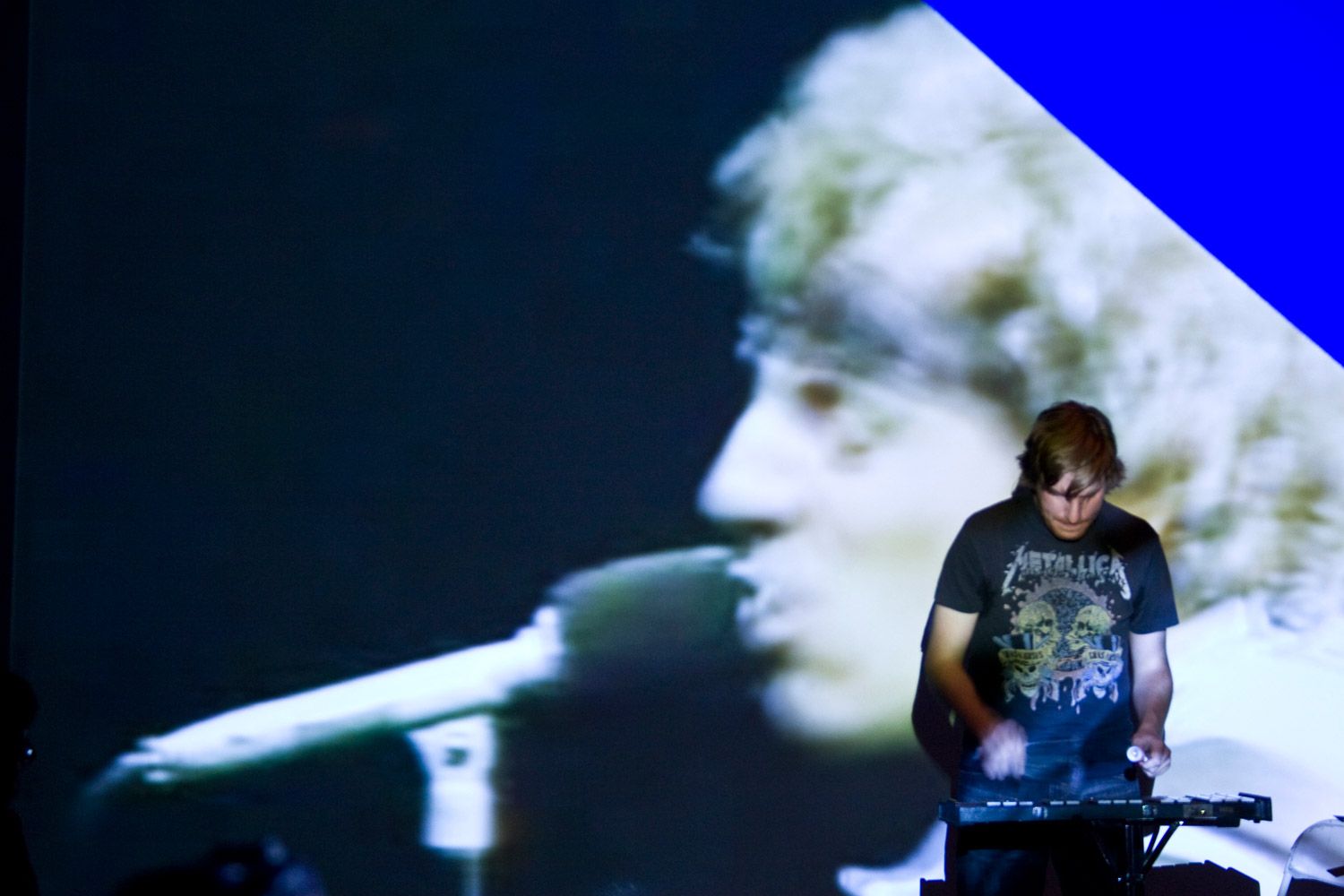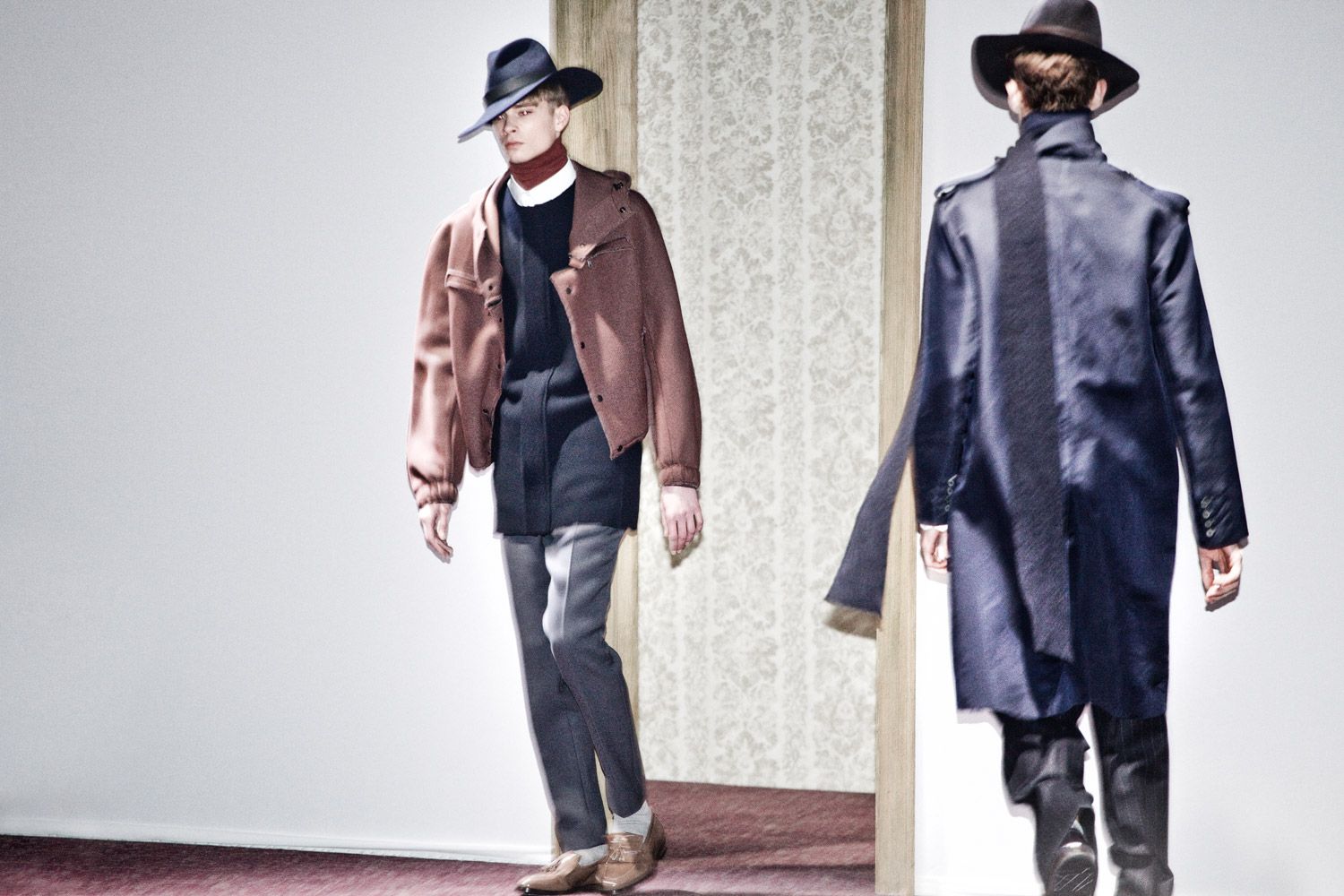WESTBAM: You Need The Drugs
|ULRICH GUTMAIR
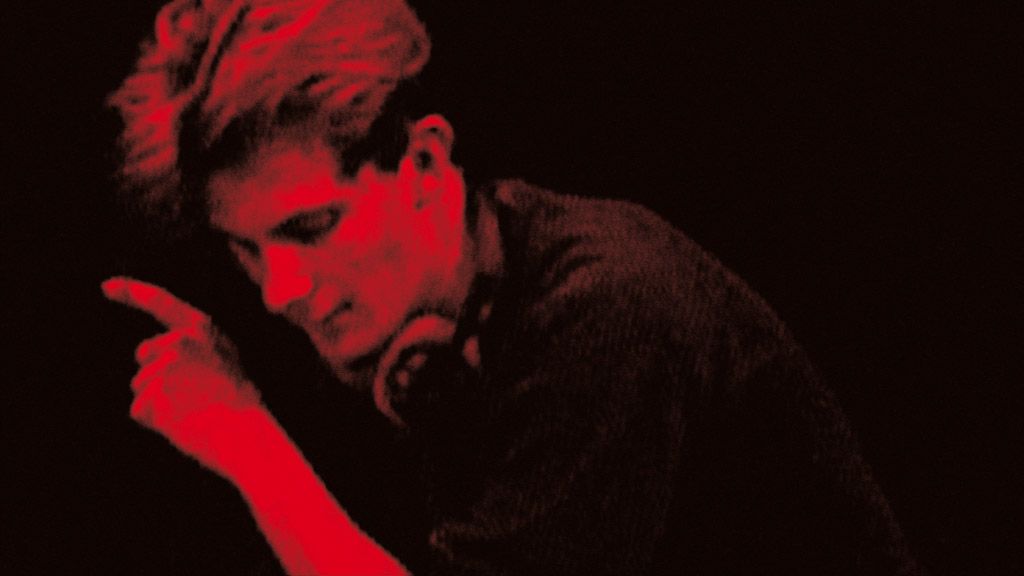
A music video for WESTBAM’s new track evokes memories of West Berlin subcultures in the 1980s. Here, the Westphalian techno revolutionary meets fellow DJ legend FETISCH to chronicle the nightlife in the German capital before and after the collapse of the wall.
Ulrich Gutmair: Westbam, the video for “You Need The Drugs” was put together from old footage of West Berlin nightlife. While Richard Butler from the Psychedelic Furs is singing about taking drugs, you can see über-cool new wave girls, drunken punks, and dancers presenting themselves as wild creatures of the night – they’re high, they’re kissing each other, they’re chauffeured in a taxi through the city. These are seductive images that immediately strike one with the thought: you really want to be there.
Westbam: I’m surprised how well this era was documented! Much better than the early techno days, there’s a lot less material from then. Actually, we always wanted to do something similar about the early 90s.
Fetisch: I think it’s masterfully put together. The best thing about “You Need The Drugs” is how it comes together with the music to create something new. You can see images of Tom Kummer, the Swiss journalist who tried to be Martin Kippenberger and set the Berlin Wall on fire. At the end of the video are shots from New Year’s Eve in 1987 with my ex-wife and I. I remember one of the DJs had one of those early video cameras that were as big as storage chests. On New Year’s Eve he pulled the thing out, otherwise in clubs like Dschungel no one would want to be filmed or photographed. I think the other shots are from an art student who filmed his taxi guests.
“Are we living in the heyday of the culture or are we at the moment of decline?
Westbam: Jörg Hoppe, the music producer, put B Movie together about the Berlin subculture in the late 70s and early 80s. He was my music publisher in Berlin when my first record at Wall City Records came out in 1985. Jörg was undecided if the new music was anything. Then the 20-year-olds in his office tried to record it with their cell phones through the door, they rushed in and wanted to know what it was. This is what convinced him, that his young employees thought it was good. Then, of course, we had the idea that if our music was used for Jörg’s film it would be really nice if we could turn it into a video. Jörg cut together 30 seconds, and I loved it. When it was ready – I can only describe this as one of those very rare epiphanies – it totally moved me, it fit better than anything you could imagine.
It seems that the 80s revival has gone on twice as long as the 80s. Today young people grow up with a whole archive of pop, and it has an impact on music. I think it works on the new Westbam album – old heroes singing over house beats.
Westbam: For me, the reason for this album is to develop a feeling of what music is. DJ music in particular and music in general, but also the nightlife and parties – what is that? What was it for me 30 years ago when I first lived it? How is it today and how will it be in 10 or 20 years? I’m concerned with timelessness. The idea that the journey starts with the release of my first single makes sense to me because that was my first world. The whole album revolves around this conception of nightlife. Now when younger people see this video, many would think that it’s the 80s, but hopefully there would be a few who find themselves in it and realize: That’s me too. That’s my nightlife.
The beauty of the video is that you can identify with the people that you see in it. You look for this mood, you want to experience these situations when you go out.
Westbam: You can always philosophize: are we living in the heyday of the culture or are we at the moment of decline? Is there just now something completely new? A 16-year-old, new to nightlife, will always live it as a revolution. We feed from this too. When you experience a record with the excitement of people who have never heard something like it, it’s transmitted to you. When I’m in the studio I can work on something for weeks. Then I stand beside someone who doesn’t even have to say what they think of it. It’s enough for them to stand next to me and hear it with me – then I can hear it through their ears. You realize immediately what’s right and wrong in the recording.
Fetisch: Absolutely, only when you’re playing it for someone do you realize this.
“David Bowie said that in his life he never felt as unobserved as he did in the two or three years that he lived in Berlin. I remember when Mick Jagger stood on the bar at Dschungel and not one head turned.”
Westbam: If you’re not receptive, then you’re not a good DJ. When you’re receptive, then you can feel what someone feels and experience it for the first time.
Fetisch: In the 80s, you could finally do what had already been done in art since the 20s – taking things out of context and merging them into something new. This is what still reigns from the 80s. Sampling and DJing allowed us to finally concentrate on the essence. The best part now is that everything can be made on a laptop. Every 14-year-old in the suburbs who wants to can craft the next big hit. It’s become super democratic, you don’t have to run to some coked-up asshole in some boardroom and prostrate yourself.
Westbam: At the time I wrote an article about how the new music of the 80s is DJ music, that the new technology of sampling enabled the understanding of music as a construction that followed the principles of collage, but Tempo never printed it. The traditionalists didn’t want to hear this – that punk was at the end of its era and DJ music was the beginning of a new one. Tempo didn’t print the text because they thought this idea was grotesque. They said : “Sorry, we can’t print this – we’ll look like fools.” But I told them, “This is just getting started!”
Fetisch: I’m a born Berliner, but for the greater part of the 80s I lived in New York, then London in the early 90s, because it was too narrow here. In the end, there were only a few places where you could get together in Berlin. The reality was completely different from what appears in the video. Outside of these niches, it was really conventional. The punks didn’t want to accept that it was over and I was really annoyed because I wanted disco and electro, glamour and progress.
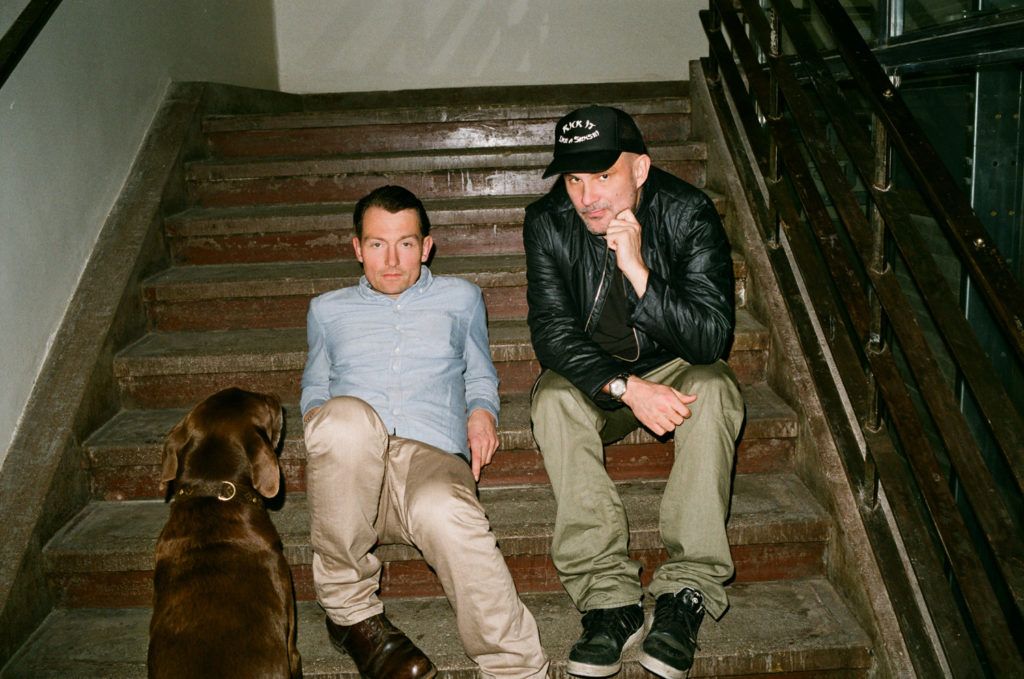
The West Berlin subculture is celebrated, but the stuffiness of West Berlin has been completely forgotten.
Fetisch: This city, this country, but above all this city in the middle of it all, is incredible. When I came back from London or New York, I was always struck by how bigoted and narrow-minded it was here. Most people in the video look like punks, but punk was done in 1978, only not in Berlin. In Berlin it wasn’t over for 20 years. In 1978 I secretly listened to disco and reggae, but I could only tell my closest circle of friends.
Westbam: I was in Berlin for the first time in 1979 at the age of 14. It was a revelation. At the time I was actually the first punk in Münster. When I arrived at the Zoo Station, we – myself and the second punk from Münster, or the first, we were arguing about it – stood there on the Ku’damm. Some grannies were walking past and they didn’t even turn around. I hadn’t experienced this before. This was new – the little old ladies in West Berlin weren’t impressed by anything.
Fetisch: Münster is a lonely town, when you’re the only punk around. For the West German provincials it was definitely something else.
Westbam: Provincial is right in my case. David Bowie said that in his life he never felt as unobserved as he did in the two or three years that he lived in Berlin. I remember when Mick Jagger stood on the bar at Dschungel and not one head turned.
Fetisch: That was also the principle. No one was celebrated. When I was coming up as a 12-year-old punk, it was about always making something new. When I think about Westbam, you, then it’s not at all punk in context, rather the complete opposite which I lived while the others were in the Risiko bar. SO36 in Kreuzberg was cool in the beginning, but when Kippenberger was gone, not so much. I didn’t go into these places, but secretly I went to the gay bars where disco and high energy was playing. Saturdays after Dschungel I would go to Metropol, preferably at the front where all the leather gays were, then you would hear “Menergy” from Patrick Cowley. I’ve always liked the people there, it was somehow anonymous. Not just checking people out: What’s he wearing today? This was a really special cosmos.
Westbam: You always looked at who was wearing what, Fetisch, but you always looked the best!
Westbam, when did you move to Berlin?
Westbam: I’ve been registered here since 1980. I was 15. Of course, for the West Germans this was a place to avoid the army. I was already registered in Berlin before I got the so-called call to military service.
You did it like many others – because Berlin was under the control of the Allies, West Berliners didn’t have to carry out any military service.
Westbam: When I moved to Berlin in 1984, I was a West German teenager that had been here on a punk vacation. I already knew Fetisch by sight. My first girlfriend in Berlin was one of his fans. She was always saying, “Oh Fetisch is DJing there, oh Fetisch is playing there …” I had this thing with Metropol too. For me at 16, as a teenager who wasn’t gay and is experiencing this world for the first time, this was something incredible. This high life, when AIDS was only an idea. You would come up there with your Hawaiian shirt and encounter leather, fog, screams, whistles, beats – and I just thought: “This is cool here, what energy. What a cool, different world.” In Metropol I experienced how records are mixed and played at 130 BPM. When I was back in Münster to finish school, I started to play records. Then I discovered mixing, I learned it and practiced at home in my room. I would mix for five hours a day and make demo tapes. William Roettger, who I later founded a record company with, knew the boss of Metropol, Jacques Ihle, because he sold him second-hand suits from the 50s. The DJ at Metropol, DJ Chris, who was also a legend, had fallen out with Ihle. Then I got my first chance to spin there, which was really stunning as a teenager. Even today that remains the biggest mystery of my career. I held it for two years. For the few people in Berlin who could mix, this was the temple and they all wanted to play there.
Fetisch: I worked in the Danceteria and at Christmas and in the summer I always went home to my grandmother. By chance in 1986 I stumbled onto a thing called Macht der Nacht (The Power of the Night). That was in a tent, at that time there wasn’t even real house music. Maybe there were 20 house records. I came there and thought “Woah! What is going on here? There’s something new happening here!” It was what I had been searching for, a cosmos of rhythms. As a 13-year-old punk, when I heard “Killing an Arab” from The Cure, I said, “I pray for only drum music, please!” I got this from Westbam at Macht der Nacht for the first time. Westbam created something. I can’t think of anyone else that did this so early in Europe.
Westbam: Macht der Nacht was the next big thing. In 1986/87 you could go there and embrace house music. Metropol closed, but that’s what’s good about Berlin. In other cities, like Frankfurt, there have been the same disco bunkers that have been the place to be for decades. In Berlin, every time has places and spaces, and then something new comes along and it’s never promoted with a lot of effort – the advantage is that it’s also easier to change places. Berghain, on the other hand, looks like an old Berlin shed, but it’s also a bit like the disco bunker from Frankfurt.
Fetisch: I see it differently. I think Berghain is like Paradise Garage in New York.
You went dancing at Paradise Garage?
Fetisch: Sure, I met my wife there; you can see her in Westbam’s video. The experience of Paradise Garage has accompanied me throughout life. What I experienced there and in Germany, actually in Metropol, is a definite feeling. It’s something that I still look for today and luckily as a DJ, sometimes still have. When you get goose bumps, when they run up your back, what was once a kind of religious ecstasy, a unity around the bass drum. Sure, Paradise Garage was huge, but Berghain and Panorama Bar come close. They have the best people playing there. I’m not there every week, but when I have been there, I’ve never been disappointed. Of course, something as successful as Berghain is also criticized. But to run such a huge place on that level, how they do it, it’s hard work, and I think it’s super successful. When I look for this pure feeling, I usually find it there.
Westbam: In the end Berghain is what Berlin has become. A melting pot, where the cool people from Buenos Aires, Tel Aviv, Paris and so on, come together. But that’s definitely not what I find best about Berlin. Berlin is a metropolis, a bit like New York in the 80s or maybe even in the 70s. I went on a safari to Neukölln recently and there it’s still a bit obscure, a bit loserish. The people in Berghain seem like they’re going to play themselves. In Neukölln, on the other hand, the people are a bit dopey, undergrad moderate types who don’t want to represent anything for anyone. They’re just going about their business. They play cool music but without much ambition or intention. When I was in Neukölln, I thought: I love this Berlin too. It was really noticeable in the last 10 years, the whole world is coming to Berlin and Berlin has become a bit like Ibiza.
Fetisch: It keeps our industry alive!
Westbam: Yeah, you’re right, but I find that it’s become a submerged, obscured world, that’s not caring what’s happening around it. The real capital city is one that only cares about itself. I always think this is the thing about Berlin: that Berlin’s horizon ends behind Berlin.
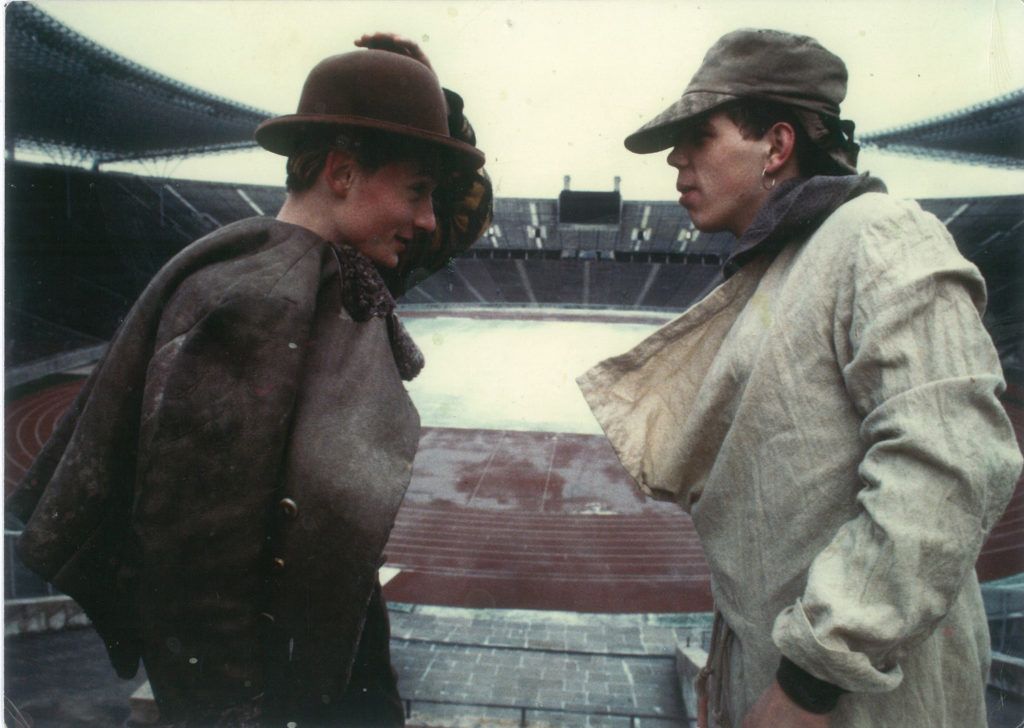
Fetisch: Absolutely. I’m glad that there are both, otherwise I wouldn’t be here. The world that we used to work for, you in your way and me in mine, the world we dreamed of, it’s here now, even then it’s very sobering. I wished for it all. I wished that there would be Berghain. I wished that there would be 200 clubs in Berlin and 20,000 DJs. At that time the people thought I was insane when I said, “I will be a DJ!”
Westbam: But even more generally: the idea that there is a place like Berghain where people will stand in line for hours, get rejected at the door, and then go back the next week – I have to say – in this respect I’m punk and lose respect for those people.
Fetisch: This is a part of nightlife. It will always be a part of nightlife. And the people love it! They don’t want to be democratic – they want to experience it just as it is.
Westbam: People are dogs who want to be beaten.
Fetisch: Maybe, but don’t forget the people who get in.
Westbam: I don’t want to think about it – I’m trying not to realize.
Fetisch: “I Wanna Be Your Dog.”
Westbam: “I Wanna Be Your Dog” is the best song of all time.
Fetisch: The door always belongs to nightlife. Always! For me anyway –I rely on the door. Often I am so grateful to the door.
Let’s come back to what Westbam said earlier about the uniqueness of the West Berliner – to do their thing in some basement and not worry about what the rest of the world does. In my mind, this could be read as an apt description of West Berlin.
Fetisch: Also East Berlin. Details magazine, when it was still good, sent me to Berlin to explore the nightlife in West and East Berlin, and I’ve got to say, I found similar places that were, at the same time, completely different in East Berlin, I was sent to the wackiest places. I was completely naïve. Then I met a black girl in Friedrichshain who took me to other places. I still remember how we went to Müggelsee and stayed in a little wooden house. People were playing tapes. There were major gaffes in the music, but “Planet Rock” from Afrika Bambaataa was playing too. We can thank the Lord that the Wall is gone, otherwise Berlin would be Wolfsburg or something. I don’t believe that West Berlin could have flown that flag much longer.
Westbam: It’s hard to imagine how it would have been if the Wall hadn’t fallen.
Fetisch: What was the nightlife like in 1988/89? Since I wasn’t here, I couldn’t say.
Westbam: As a newcomer you enjoyed the different facets. You were the one who went to Metropol, but not in Risiko. Of course, I went straight to Risiko. Gabi Delgado-Lopez from D.A.F. (Deutsche-Americanische Freundschaft) and I had the first house party at Ex’n’Pop with an 808 and the first 20 house records. The next day we went to a poetry reading from Nick Cave. We fantasized so much about this, we wanted this underground flair. The underground flair was a place like Ex’n’Pop, but of course they wanted to hear completely different music – Einstürzende Neubauten, Country & Western.
Fetisch: Jesus Christ.
Westbam: But I realized that house music somehow works with this. You think of a scene and you mix it. A run-down location with some funny characters, and then you played Adonis’ “We’re Rocking Down the House.”
Fetisch: Oh yes!
http://www.youtube.com/watch?v=HuTm6K-S2hU
Westbam: They didn’t dance though, but on the other hand, they accepted everything and with great Berlin indifference as it pounded into their ears for nine hours.
Fetisch: I’m heterosexual, but this incredible nightlife is at least 50 percent homosexuals. At the moment when the scenes separated, I was gone. Not because I wanted to meet a man, but because the energy was fascinating. The gays know how to party, so it’s not terribly strict and stoic and self-destructive. It’s a celebration of self and your opposite.
Westbam: The Berlin nightlife of today also culminates in a positive way at Berghain. The mix, where gays are the hosts but it’s not completely exclusive. This tradition went further in places like Planet, E-Werk, and today in Berghain. In Chicago it starts with Jesse Saunders, who, as a black heterosexual in a black gay club, was afraid at first, but he thought the music was good and said to himself: I’m going to make something like this for my homies.” When this cultural transfer happens, when the gay club world meets the other, then it gets good. Now you go into a gay club and remixes from Kylie Minogue are playing, it hurts my soul.
Fetisch: You’re going to the wrong gay clubs. Go to Ficken 3000. This is one of the best little clubs in Berlin, for me it comes in second after Berghain.
Westbam: One of the best Berlin moments in the last three years was at the gay and lesbian street festival in Schöneberg. This was the crowd I had always dreamed of – kids and retirees jumped around, the newly risen and the leftovers. In the best moments they all party together.
Fetisch: This is the idea of a block party.
Westbam: Exactly! But I never experienced it that good before.
Fetisch: This is what I love about this kind of music – that you don’t have a band, rather people that gather together. It doesn’t matter if it’s made with samples or appropriated.
Westbam: We did this album through free association. First we had music and then thought, which voice would be good with this? This is how these combinations came into existence. Of course one is always a fan, especially a fan of people that came out of a certain time when you were making a place for yourself. And here comes the time that we just asked the singers from Psychedelic Furs or the Stranglers.
Fetisch: New Order! Iggy Pop!
Westbam: Yes, Iggy anyway. Iggy was my first concert.
Fetisch: Tell me one slip-up this man has made. This is the perfection of an artistic biography. Iggy was always on track. Mick Jagger didn’t achieve this, neither did David Bowie.
Westbam: Above all is Iggy Pop. Iggy doesn’t worry about his image. I sent him this track, because I thought it would be cool. If I sent it to some German rockers, they would think: “Westbam and techno – is this good for me? Iggy likes music, he doesn’t need to think about these things.
Credits
- Text: ULRICH GUTMAIR
